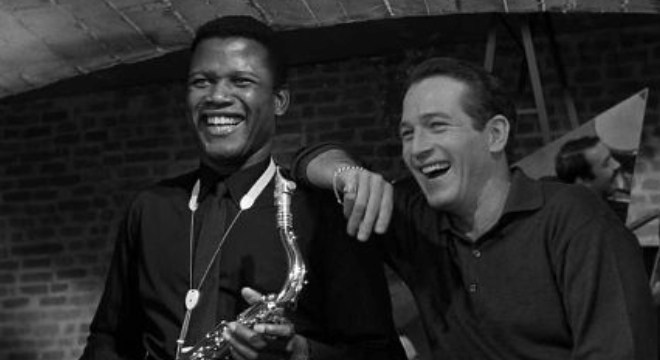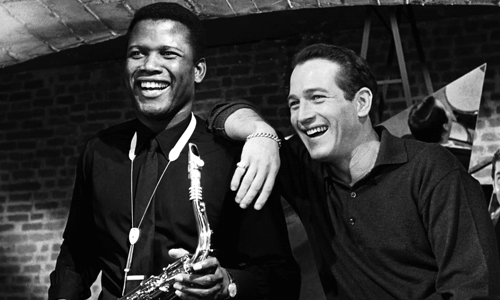
Paul Newman has been TCM’s star of the month this May; presumably because the programmers knew just how many of his films I hadn’t seen and decided to make me happy. On my must-watch list, Paris Blues, a film I’ve longed to see, if only to further appreciate the origins of this gif:

Directed by Martin Ritt and based on Harold Flender’s 1957 novel of the same name, Paris Blues stars Paul Newman as Ram Bowen and Sidney Poitier as Eddie Cook, a pair of American jazz musicians living in Paris. They meet tourists Lillian Corning (Joanne Woodward) and Connie Lampson (Diahann Carroll), two friends on holiday from the US, and the couples fall in love against the backdrop of Parisian bohemia and hot jazz.
A cinematic B-side to The Hustler and A Raisin in the Sun, both released the same year, Paris Blues isn’t exactly a classic, but it does have its moments.
If you can
get Duke Ellington to write your score, do it.
The jazz in Paris Blues is impeccable thanks to Ellington’s atmospheric score, which blends standards like ‘Sophisticated Lady’ and ‘Mood Indigo’, played by Ram and his sextet in the club scenes, with original compositions. (Murray McEachern did Newman’s trombone playing on the soundtrack; Paul Gonsalves dubbed Sidney Poitier’s tenor saxophone.) The film leans hard on Ellington, especially during the endless montages of a moonstruck Eddie and Connie strolling arm in arm or running up and down the steps in Montmartre. Ellington was nominated for an Oscar but lost to West Side Story. Tough year.
Louis Armstrong should have had more chances to play characters, not just himself.
Armstrong usually appeared as himself in films, but here he
plays Wild Man Moore, a musician and acquaintance of Ram’s whose arrival in
Paris brings a train station to a standstill. Charismatic and completely at
ease, Armstrong has just two scenes and makes them the most memorable in the movie.
The ‘Battle Royal’, a jam session in which Moore challenges several members of
Ram’s sextet in turn, is reason enough for Paris
Blues to exist and makes you wonder if the film is about the wrong
characters. Incidentally, Eddie and Ram’s reaction to Moore making a surprise
entrance to their club, leading his entire band in a parade, is the source of
the gif.
The lack
of focus on interracial relationships is glaring.
Paris
Blues plays with the possibility of interracial romance when Ram
first meets and flirts with Connie. Yet as soon as all four characters are
introduced to each other they neatly pair off by race and that’s that. Fine, Guess
Who’s Coming to Dinner was still a few years away and United Artists was
reluctant to take the risks Ealing Studios did with Pool of London a decade earlier. But we don’t see much of the
interracial friendships either. The wariness in Carroll’s eye as Connie sizes Ram
up at the train station and tries to shield a smitten Lillian from him, or the
genuine humility in Newman’s voice as Ram apologises to Eddie after an argument,
hint at warm, longstanding friendships the film doesn’t really explore. Did
Connie and Lillian go to university together? Did Ram and Eddie meet at a club
or a party? We’ll never know.
Not all
message films age well.
Poitier and Carroll’s characters are defined by their race in a way that’s both understandable and frustrating. Eddie finds expatriate life in Paris a release from the bigotry and racism he faced in the States; Connie believes he’s running away from problems he could help solve. All their conversations seem to revolve around her trying to persuade him to return to the US and the struggle. Paris Blues’ poster promises, “A love-spectacular so personally exciting you feel it’s happening to you,” but in Eddie and Connie’s case, we never learn what drives the whirlwind of their romance. Poitier smiles winningly and there’s a brief scene where Eddie extravagantly buys Connie flowers from every stall they pass, until her bouquet is overflowing and he runs out of money. At least Ram and Lillian talk about their relationship: his fear of commitment, her forthright love. The film’s treatment of its black characters is all the more disappointing because Eddie and Connie were the original novel’s protagonists. Ritt’s film preserves Flender’s examination of race and racism, but shunts it to a B-plot.
Paul Newman makes clichés easier to bear.
Watching Ram Bowen is like playing cinematic jazz musician bingo. He’s a gifted improviser trying to write ‘serious’ orchestral work. He’s a ruthlessly driven artist and a womanizer. He helps one of his musicians score a fix so the latter will be in shape to play. (Double points for drug addiction appearing only 15 minutes in.) Newman takes every cliché, adds his considerable charm (just look at that smile!) and whips it all into a performance worth seeing. Watching him is always a pleasure.
Leave a Reply